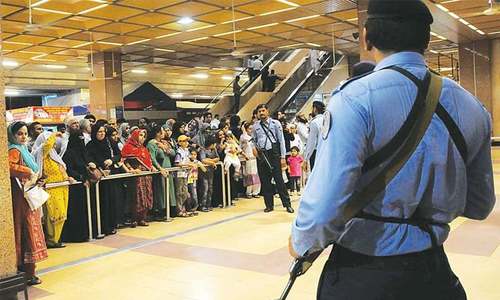KARACHI: The Sindh High Court has asked the directors general of the Civil Aviation Authority (CAA) and Airport Security Force (ASF) to hold a meeting to revisit the existing security measures at all airports and to modernise and revamp explosive detectors if further steps are required.
A two-judge bench headed by Justice Mohammad Ali Mazhar also directed the CAA and ASF to improve safety and security arrangements at the airports, aerodromes, aircraft and civil aviation installations.
Disposing of a petition against manufacture and use of bomb detectors (Khoji) at the airports, the bench directed the ASF to maintain foolproof safety and security at all airports and also safeguard civil aviation installations against acts of unlawful interference in accordance with the provisions envisioned under Section 6 with other enabling provisions of the Airports Security Force Act, 1975.
“The Director General CAA and Director General ASF for their utmost satisfaction shall convene a high profile meeting within 15 days to revisit the security measures in the larger public interest and in case any further endeavours/measures are required to modernise and revamp the present detector “Khoji” and or some alternate or additional or any other advanced technology is required to be opted, added or preferred for improvising the safety and security measures at airports, aerodromes, aircraft and civil aviation installations/parking areas, the CAA shall make necessary arrangement for such equipment or technology for ASF,” the court ordered.
ASF maintains that Khoji bomb detectors are working fine
The bench in its order observed that though the ASF was confident with regard to performance of Khoji, it was further informed that the CAA was responsible for provision of such equipment to the ASF and thus if the court found it necessary to replace the existing equipment, CAA may be directed to provide latest and state-of-art alternative device for explosive detection.
It further stated that the petitioner wanted absolute ouster of Khoji detectors, but no alternative solution was suggested as a stopgap arrangement and at the same time the ASF in its reply stated that they were very much confident with the performance of their developed device Khoji and they were not using any banned ADE-651 explosive detector.
The ASF further maintained that the performance of Khoji was well authenticated and they detected thousands of ammunition and hundreds of arms at the main entrances of different airports and the armed forces and law enforcement agencies were also using the same device.
In its reply, the CAA reproduced the same assertion and said that it was responsible to provide equipment and the ASF was responsible to maintain and provide foolproof security.
The petitioner NGO stated that the purpose of filing the case to draw attention of the court to an alleged scam orchestrated by a British national who was involved in assembling and using of fraudulent bomb detectors, which allegedly affected the country in dealing with its security measures.
The petitioner further stated that these detectors were manufactured by a British company under the name and style of ADE-651 which claimed that their device could effectively detect the presence and location of various types of explosives from a long range and Pakistan allegedly purchased ADE-651 detectors for the use of the ASF.
The petitioner alleged that despite banning the export of ADE-651 by the British government, the respondents took over the making and selling of this device under the brand name Khoji.
The counsel for the petitioner pleaded that the use of fraudulent bomb detectors should be put to rest by restraining its licensing, manufacturing and usage in Pakistan.
The deputy attorney general (DAG) argued that the ASF was responsible for taking effective measures for ensuring security of airports and it officers and members were subjected to the Pakistan Army Act for disciplinary purposes.
The DAG further asserted that ASF neither procured explosive detectors ADE-651 nor manufactured, used or sold it, adding that in 2008-2009, the ASF procured Sniffex explosive detectors, which were very costly and thus the ASF with the help of EME Engineers developed its own explosive detector Khoji, which were being used at the car parking gates for scanning of vehicles.
He further said that Khoji was developed by army engineers as an alternative technology for detection of explosives and arms/ammunition whereas the imported explosive detector Sniffex was found less effective in detection of explosive material.
The DAG argued that the petition was filed merely on presumptions with baseless allegations, whereas banned explosive detector ADE-651 was never procured by ASF.
Published in Dawn, December 26th, 2019
































